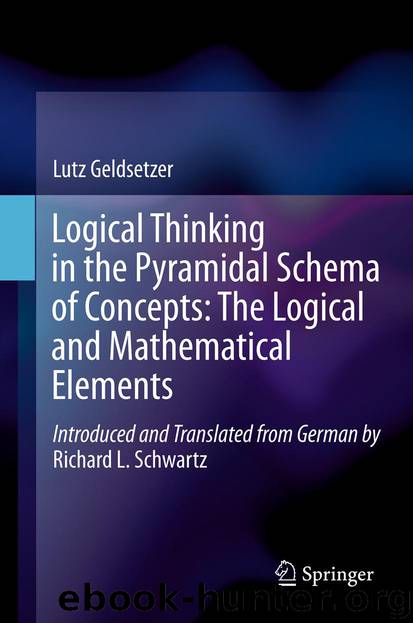Logical Thinking in the Pyramidal Schema of Concepts: The Logical and Mathematical Elements by Lutz Geldsetzer & Richard L. Schwartz

Author:Lutz Geldsetzer & Richard L. Schwartz
Language: eng
Format: epub
Publisher: Springer Netherlands, Dordrecht
Corollaries and Annotations to the Paragraphs
0.That logic is the “organon” or “instrument” of all sciences and erudition was always felt – although not always taken seriously – in the history of occidental science. Aristotle, who assigned it that role, did not clearly say whether logic itself should be a science (episteme) or not, and, if not, whether it could be carried on as a practical art as distinct from a (scientific) technique, since in Aristotle’s time and for long afterwards the same term was used for both. (Greek: “techne” = Latin: “ars”). Only the Stoics expressly denominated logic a science. Consequently, logic developed in different times and contexts into all of these. But Aristotle did clearly assign mathematics as a “second episteme” to the theoretical sciences and situated it between metaphysics (or ontology) and physics. This suggested that mathematics also required logical instruments for its constitution. That suggestion was neglected for ages, but then adopted by modern “mathematical logicism”. – Perhaps because Aristotle’s logic has always been well-known and intensively studied, his teachings concerning mathematics, in contrast to those of Plato and Euclid, have been underestimated by the historians of philosophy. Some references: Joseph Biancani, Aristotelis loca mathematica ex omnibus eius operibus collecta, Bologna 1615; A. Görland, Aristoteles und die Mathematik, (Diss.) Marburg 1899; J. L. Heiberg, “Mathematisches in Aristoteles”, in: Abhandlungen zur Geschichte der mathematischen Wissenschaften 18, Leipzig 1904, p. 1–49; Th. Heath, Mathematics in Aristotle, Oxford 1949; H. G. Apostle, Aristotle’s philosophy of mathematics, Chicago 1952; I. Mueller, Aristotle on geometrical objects, in: Archiv für Geschichte der Philosophie, 52, 1970, p. 150–71; J. Lear, Aristotle’s philosophy of mathematics, in: Philosophical Revue 91, 1982, p. 161–192; J. Barnes, Aristotle’s arithmetic, in: Revue de philosophie ancienne 3, 1985, p. 97–133; E. Hussey, Aristotle on mathematical objects, in: I. Mueller (ed.), Peri ton mathematon, Edmonton 1991. – See also M. Cantor, Vorlesungen über Geschichte der Mathematik, vol. I, 3. ed. Leipzig 1907, p. 251–256.
0.1.On the problem of formalism in logic and mathematics see: L. Brouwer, Intuitionistische Betrachtungen über den Formalismus, in: Sitzungsberichte der Preußischen Akademie der Wissenschaften 1928, p. 48–52; R. Carnap, Formalization of Logic. Studies in Semantics II, Cambridge, Mass. 1943, 2. ed. 1959; S. Krämer, Symbolische Maschinen. Die Idee der Formalisierung in geschichtlichem Abriß, Darmstadt 1988; T. Stoneham, Logical Form and Thought Content, in: Analysis 59, 1993, p. 183–185; L. Horsten, Platonistic Formalism, in: Erkenntnis 55, 2001, p. 173–194; G. Brun, Die richtige Formel. Philosophische Probleme der logischen Formalisierung, Frankfurt a. M.-London 2003.
0.1.1.Inaugurators of “ideal languages” were G. Dalgarno (1626–1687), Ars signorum vulgo character universalis et lingua philosophica, London 1661, and J. Wilkins (1614–1672), An Essay towards a Real Character and a Philosophical Language, 1668, with their versions of “Characteristica universalis”. See L. Couturat and L. Léau, Histoire de la langue universelle, Paris 1903. – G. Frege, Begriffsschrift, eine der arithmetischen nachgebildete Formelsprache des reinen Denkens, Halle 1879, B. Russell and A. N. Whitehead, Principia Mathematica, Cambridge 1910–1913, and L. Wittgenstein, Tractatus logico-philosophicus (3.325), 1921, continued to promote this view of logic, and it is due to their influence that it has become almost universal in modern logic.
Download
This site does not store any files on its server. We only index and link to content provided by other sites. Please contact the content providers to delete copyright contents if any and email us, we'll remove relevant links or contents immediately.
The Mikado Method by Ola Ellnestam Daniel Brolund(22542)
Hello! Python by Anthony Briggs(21724)
Secrets of the JavaScript Ninja by John Resig Bear Bibeault(20297)
Dependency Injection in .NET by Mark Seemann(19635)
The Well-Grounded Java Developer by Benjamin J. Evans Martijn Verburg(19406)
Kotlin in Action by Dmitry Jemerov(19348)
OCA Java SE 8 Programmer I Certification Guide by Mala Gupta(18841)
Algorithms of the Intelligent Web by Haralambos Marmanis;Dmitry Babenko(17650)
Adobe Camera Raw For Digital Photographers Only by Rob Sheppard(16969)
Grails in Action by Glen Smith Peter Ledbrook(16801)
Test-Driven iOS Development with Swift 4 by Dominik Hauser(10948)
Becoming a Dynamics 365 Finance and Supply Chain Solution Architect by Brent Dawson(8071)
Microservices with Go by Alexander Shuiskov(7834)
Practical Design Patterns for Java Developers by Miroslav Wengner(7735)
Test Automation Engineering Handbook by Manikandan Sambamurthy(7696)
Angular Projects - Third Edition by Aristeidis Bampakos(7181)
The Art of Crafting User Stories by The Art of Crafting User Stories(6627)
NetSuite for Consultants - Second Edition by Peter Ries(6550)
Demystifying Cryptography with OpenSSL 3.0 by Alexei Khlebnikov(6324)
